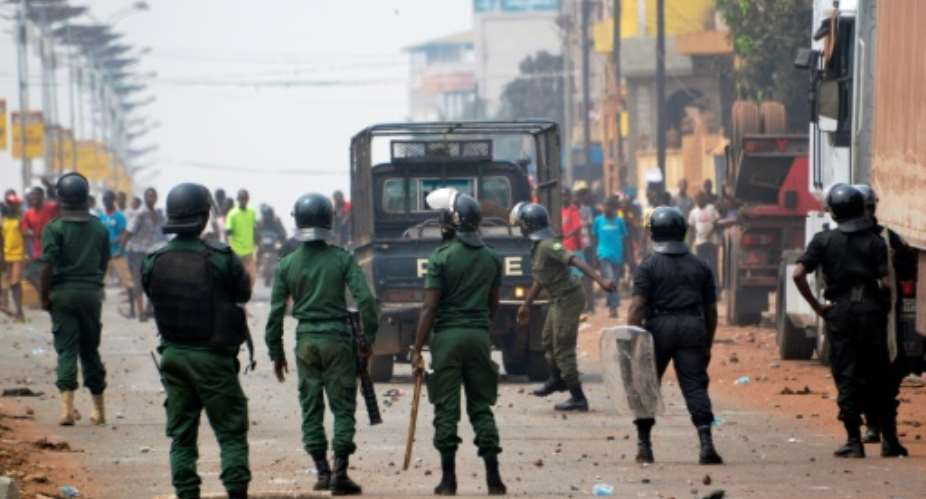Thousands of young people erected barricades and blocked traffic in the Guinean capital Conakry on Monday with markets and schools shut as mass strikes gripped the city.
A general strike was called by the Guinea General Union of Workers (UGTG) in addition to an ongoing walkout by teachers and a complete shutdown of economic activity demanded by the opposition after disputed local elections.
Conakry's biggest market, Madina, failed to open its doors along with the vast majority of businesses, as youths overturned bins and set tyres on fire, cutting off entire sections of the city to vehicles.
Police made 15 arrests in the Kaloum district, where civil society groups were protesting against the two-week closure of schools.
An on-off teachers' strike that has paralysed the education system shows no signs of stopping despite a government offer at the weekend to increase pay.
Former prime minister Cellou Dalein Diallo's Union of Democratic Forces of Guinea (UFDG) saw a strong response to its call for a "ville morte" or "dead city" protest, demanding that all economic activity cease and people stay inside.
The victory of President Alpha Conde's ruling Rally for the Guinean People (RPG) in the February 4 vote was marred by post-electoral violence involving supporters of the losing parties.
The UFDG has condemned what it terms "massive fraud" during voting, leading to unrest and the deaths of at least 10 people.
An opposition figure told AFP on Monday they were "celebrating the success" of the protest movement, adding that "the next few days will be even harder for those in power, which already has a hot potato in its hands over the results".
Teachers ignore pay increase
The powerful UGTG union had joined the teachers and opposition figures by calling for workers to stay at home on Monday.
It has cited mismanagement of the national social security system, poor regulation of subcontracted jobs and a perceived indifference to workplace accidents and arbitrary firings for the strike.
The UGTG has called on public and private sector employees alike to boycott their workplaces.
The triple challenge will add to the pressure on Conde to complete promised reforms and speed up negotiations with all parties concerned.
The government urged teachers who have held various walkouts since December to head back to class on Monday and end their most recent strike, a demand they have flatly refused despite the offer of a 10 percent pay increase over the weekend.
Guinea's education ministry said "all measures have been taken to make schools secure so that classes can take place in the best possible conditions," following protests near some establishments by disgruntled students.
Classes will be repeated and examinations potentially delayed to address the days lost by the strike, the ministry said.
Teachers have requested that a pay rise of 40 percent agreed in October 2017 be implemented, with back pay.
"For as long as the 40 percent (increase) with back pay is unpaid... we will not be going back to school," the teachers' unions said Saturday.





 We’ll no longer tolerate your empty, unwarranted attacks – TUC blasts Prof Adei
We’ll no longer tolerate your empty, unwarranted attacks – TUC blasts Prof Adei
 Bawumia donates GHc200,000 to support Madina fire victims
Bawumia donates GHc200,000 to support Madina fire victims
 IMF to disburse US$360million third tranche to Ghana without creditors MoU
IMF to disburse US$360million third tranche to Ghana without creditors MoU
 Truck owner share insights into train collision incident
Truck owner share insights into train collision incident
 Paramount chief of Bassare Traditional Area passes on
Paramount chief of Bassare Traditional Area passes on
 Two teachers in court over alleged illegal possession of BECE papers
Two teachers in court over alleged illegal possession of BECE papers
 Sunyani: Victim allegedly shot by traditional warriors appeals for justice
Sunyani: Victim allegedly shot by traditional warriors appeals for justice
 Mahama vows to scrap teacher licensure exams, review Free SHS policy
Mahama vows to scrap teacher licensure exams, review Free SHS policy
 Government will replace burnt Madina shops with a new three-story, 120-store fac...
Government will replace burnt Madina shops with a new three-story, 120-store fac...
